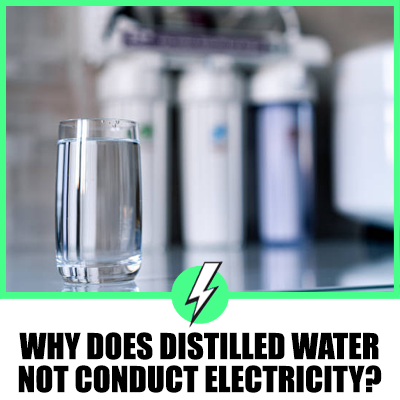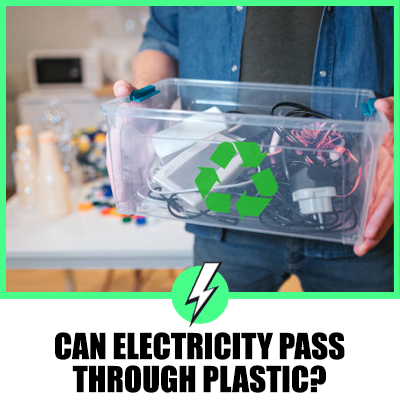Why Does Distilled Water Not Conduct Electricity? A Comprehensive Guide for UK and US Audiences
Water, in its most basic form, is often seen as the harbinger of life.
Carrying vital nutrients to living organisms.
Creating rain to nourish the earth.
Or presenting itself as a resource for a myriad of our daily needs.
But beneath its simplicity lies a plethora of fascinating scientific phenomena that have perplexed and intrigued researchers for centuries.

Contents
Does Distilled Water Conduct an Electric Current?
No, distilled water doesn’t conduct electricity.
Distilled water is a pure form of water that does not contain any dissolved impurities.
Due to which no free ions are present to conduct electricity.
Distilled water has a neutral PH value (neither acidic nor basic).
Distilled water only contains neutral water molecules which have no charge.
Thus, it doesn’t conduct electricity.
Why is Distilled Water Less Conductive Than Tap Water?
Tap water is not pure water.
It contains minerals and other dissolved salts that can ionize into the tap water.
These ions help in the flow of electric current to flow through it.
The higher the number of ions present in the water, the higher will be the conductivity.
Therefore, distilled water is an insulator because there are no ions present in it to conduct the electricity.
Additionally, to filter tap water, chlorine compounds are also added to the water.
This process of adding chlorine to tap water is also known as chlorination.
Due to the chlorination of tap water, there are sufficient Cl- ions (chloride ions) that act as free ions to conduct the electricity.
Why Water Does Not Conduct Electricity?
Pure water, or distilled water, is a very weak electrolyte and does not dissociate into ions.
Therefore, it does not conduct electricity.
However, rain water contains some dissolved acids like carbonic acid (H2CO3) and sulphurous acid (H2SO3).
Air contains traces of both CO2 and SO2 gases which dissolve in rain water to produce these acids.
As a result, water becomes acidulated and gets ionized easily.
Therefore, rain water conducts electricity.
Why Do Bases Conduct Electricity When Mixed with Distilled Water?
Bases, when dissolved in water, dissociate into ions.
These ions are responsible for conducting electricity.
For instance, when sodium hydroxide (a base) is dissolved in water, it dissociates into sodium ions (Na+) and hydroxide ions (OH-).
These ions are mobile and can carry an electric charge, allowing the solution to conduct electricity.
Conductivity of Different Types of Water
| Type of Water | Conducts Electricity? | Reason |
|---|---|---|
| Distilled Water | No | Lacks ions and impurities |
| Tap Water | Yes | Contains minerals, dissolved salts, and chlorine compounds |
| Rain Water | Yes | Contains dissolved acids like carbonic acid and sulphurous acid |
| Distilled Water with Bases | Yes | Bases dissociate into ions when mixed with distilled water |
This table provides a quick reference to understand the conductivity of different types of water and the reasons behind it.
Insights from Online Discussions:
From Quora: Bases, when mixed with distilled water, can conduct electricity because they dissociate into ions. These ions are responsible for conducting electricity.
Toppr: Distilled water does not conduct electricity because it lacks ions. However, rain water contains dissolved acids which make it conductive.
Atlas Scientific: The conductivity of distilled water is influenced by factors like temperature and exposure to air.
Doubtnut: Distilled water does not conduct electricity because it’s a very weak electrolyte and doesn’t dissociate into ions. However, rain water contains dissolved acids which make it conductive.
Techiescientist: Distilled water, in its purest form, is free from ions and thus an extremely poor conductor. However, achieving 100% pure distilled water is nearly impossible, as water readily absorbs carbon dioxide from the environment, which causes it to ionize slightly and develop minor conductivity.
In Conclusion:
While distilled water, due to its lack of ions, is a poor conductor of electricity, it’s not an absolute insulator.
Factors like the absorption of atmospheric gases and the influence of temperature can cause slight ionization, leading to minimal conductivity.
Understanding the science behind distilled water and its conductivity helps dispel common misconceptions and ensures safer practices in situations where water and electricity might intersect.
It also emphasizes the remarkable complexities hidden within the water, one of the simplest yet most vital substances in our lives.





